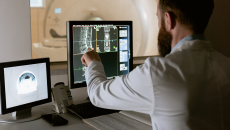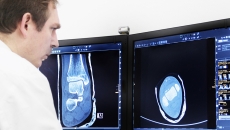Imaging
AI & ML Intelligence
Artificial intelligence can boost efficiency of imaging providers and support roles that offer greater provider productivity, says The Gordian Knot Group's Dawn Cram, who offers a preview of her HIMSS25 session on the subject.
Healthcare providers and IT vendors in the region have weighed in with their predictions for healthcare technology in the new year.
It has also been validated for Stage 7 of the HIMSS INFRAM.
As RSNA kicks off in Chicago, here's a roundup of some recent radiology and imaging IT announcements.
The new deep-learning model outperforms biomedical-imaging analysis in understanding disease progression, pediatrics researchers at Children's Hospital of Philadelphia say.
It features speech-to-text and an AI that identifies high-risk findings from slide images.
The goal is to give imaging providers a source for analytics on how their clinical artificial intelligence applications are operating over time.
AI & ML Intelligence
He has boasted about the accuracy of subscription-based Grok artificial intelligence for analyzing medical images, but physicians and researchers say the model's ability to diagnose medical conditions is limited, and privacy experts have concerns.
Healthcare providers choose PACS and VNA solutions for their ability to support day-to-day clinical operations. They also use these systems to archive millions of older studies, most of which are out of clinical life cycle. The need to migrate immense volumes of image data into a new PACS or VNA can be a significant barrier to changing systems.
EHR customers could take part in the direct sharing of health information – including X-rays and MRIs – between providers, payers, government agencies and others under the TEFCA nationwide interoperability framework.








